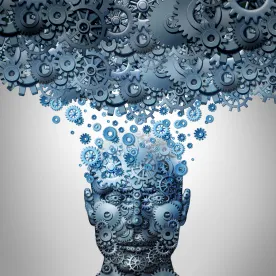The digital age is an exciting time for most of us. Some of us, of course, is a little nervous at the disruptions that new technologies will bring. There comes a time in every 21st-century lawyer’s life, however, when she or he needs to hop on the Hyperloop to the future.
Quantum Computing
First, let’s take a look at quantum computing. A quantum computer is astonishingly fast. That’s because it relies on quantum mechanics, a field where particles exist in more than one state simultaneously and can interact with distant particles.
Consider this: our “classical” computers today use a binary digit, or bit, to store data. Each bit is based on a binary system where there are two states: 1 or 0. Off or on.
Quantum computers rely on quantum bits, or qubits, as the basic unit of information. Being able to be a 1 or a 0 at the same time, in multiples, increases capabilities of quantum computing by a mind-altering degree. A quantum computer can accomplish in only a few minutes what would take a classical computer several years (if ever) to achieve.
Store that bit of information for now. Did you see what I did there?
Artificial Intelligence
There has been much talk and handwringing about artificial intelligence. Is the smart robot trying to take our jobs? It depends. For the most part, the smart robot is only trying to take the mind-numbing, tedious parts of the job. The smart robot can also handle parts of office administration, such as billing and scheduling.
Imagine being freed from having to pour over weeks or months worth of e-discovery documents. What would an enterprising lawyer to with all that extra time? The now fresh, less stressed and bored lawyer could then turn her or his attention to truly delving into the finer nuances of the craft of law. To wit, he or she would become a better lawyer.
The smart computer is going to need something to chew on. Much like Johnny 5, it’s going to want more input or data.
Big Data
Fortunately, there is so much data being produced today that we’ve even coined a term for it: big data. It’s said that by the year 2020 there will by 44 trillion gigabytes of data available. Furthermore, the amount is doubling every two years.
Much of this data will help you run your practice better, develop successful case strategies or find that obscure ruling that will put your case over the top.
This data is being generated from government resources, commercial enterprises that gather and sell information and information garnered from devices via the Internet of Things (IoT – more on this later). These are just a few of the gathering points.
Big data does not only include text, but also video, audio, and images such as those produced by drones, for example. You may have at your disposal in-depth information on judges, jury members, witnesses, and adversaries. Clients and big firms will be able to evaluate lawyers and other firms and determine their tendencies towards case outcomes and costs for the same work across many firms.
Hadoop
Of course, this means there will be a tremendous amount of work to do in e-discovery. Predictive analytic tools – such as Hadoop – will help sort out the chaos of a wide variety of data formats, data errors, unstructured information and so forth. These tools will also help predict case outcomes.
Three questions to be worked out concern privacy issues, what to keep and what to throw away, and security as there will be so much more information to break into.
Johnny 5 could definitely use a quantum computer to hash through all of this.
Blockchain
Another tool in this digital age that could help benefit law firms is blockchain. This distributed ledger technology is decentralized – transactions are recorded onto millions of computers simultaneously. Each block of data is linked to a previous block of data, that is, “chained” together. The transaction is synchronized and all nodes reflect the updated data as it occurs. Once a transaction is validated and added to a blockchain the transaction or asset is theoretically immutable.
It takes a tremendous amount of computer power to run the computers that operate blockchain. Again, another potential job for quantum computers.
Law firms could make use of blockchain in real estate recordings, wills and trusts, and creating simple contracts via smart contracts.
Augmented Reality
Technologies that will help in future courtrooms are augmented reality and virtual reality. Augmented reality places a person within an existing environment and uses digital information to augment, or add, to that environment. The game Pokémon GO is an excellent example.
Virtual Reality
Virtual reality is a three-dimensional environment created digitally in which a person may interact with an artificial computer and software generated environment.
Both of these technologies will be used in the courtroom at some point. Perhaps they will be used during meetings of parties as persuasive tools to either file a case or to not file a case. Finally, they can give a better understanding of events or situations.
Of course, we’re going to need a huge computer to generate these environments.
Internet of Things
Finally, we come to the Internet of Things. You are probably familiar with the concept, if not the name. It is where the Internet is used to connect our devices to each other, such as mobile phones, computers, and coffeemakers. Amazon’s Alexa and Apple’s HomePod are examples of IoT.
Why should lawyers be interested in the IoT? Imagine the enormous amount of information these connected devices gather. All that information, or data, contribute to the big data pool. Lawyers will figure out a way to harness this data to strengthen their cases or persuade a jury. It’s only a matter of time and a lawsuit or two to gain access to the data.
Currently, there are privacy questions being worked out about the issue of privacy and the devices being used with IoT. When a person sets up a personal assistant, can he or she still expect legal privacy in his or her own home? There are few cases where this question is being asked right now.
Conclusion
It’s fun, scary and captivating to think about coming technologies. For the most part, it’s about envisioning upcoming opportunities. AI will enable lawyers more time to “law” by filtering through a copious amount of big data that will be available. The blockchain is just now coming into its own. Augmented and virtual reality will let us see and experience better. And the IoT will help in communications and tieing it all together. Finally, we’re going to need more quantum computers to power all of this.
It’s a magnificent time to be a lawyer. We’re venturing on the cusp of something grand. There can be no question that these technologies and concepts will make the law a finer, more attuned to humanity, endeavor.




 />i
/>i

